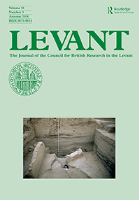
Levant
Scope & Guideline
Pioneering Research at the Crossroads of Time
Introduction
Aims and Scopes
- Archaeological Research and Methodologies:
The journal emphasizes rigorous archaeological methodologies, including fieldwork, excavation reports, and artifact analyses, to contribute to the understanding of the Levant's ancient cultures. - Interdisciplinary Approaches:
It promotes interdisciplinary research that integrates archaeological findings with historical, anthropological, and environmental studies, facilitating a comprehensive understanding of cultural development. - Cultural Heritage and Preservation:
The journal addresses issues related to cultural heritage management, preservation practices, and the ethical considerations surrounding archaeological research in the Levant. - Socio-Economic Dynamics:
Research often focuses on the socio-economic aspects of ancient societies, exploring trade networks, resource management, and community interactions throughout various historical periods. - Regional Connectivity and Interaction:
The journal highlights themes of connectivity and cultural interaction within the Levant and with neighboring regions, emphasizing the historical significance of exchanges between different cultures.
Trending and Emerging
- Micro-Geoarchaeology:
Recent publications have increasingly adopted micro-geoarchaeological methods to explore socio-economic aspects and environmental changes, indicating a trend towards detailed, localized studies that enhance our understanding of ancient livelihoods. - Cultural Heritage Ethics:
There is a growing focus on ethical considerations in archaeological practice, including discussions on the illicit trafficking of cultural objects and the responsibilities of archaeologists towards heritage preservation. - Digital Archaeology and Big Data:
The integration of digital tools and methodologies, such as remote sensing and data management systems, has become more prevalent, reflecting a shift towards utilizing technology for enhanced archaeological research and heritage management. - Interdisciplinary Collaborations:
Emerging themes highlight the importance of collaborative efforts across disciplines, with studies examining the intersections of archaeology, anthropology, and cultural heritage, fostering a holistic approach to understanding the past. - Social Dimensions of Archaeology:
There is an increasing emphasis on the social aspects of archaeological findings, including community interactions, identity formation, and cultural continuity, which provides a deeper insight into the human experience in the Levant.
Declining or Waning
- Late Antique Studies:
There has been a noticeable decrease in publications focused specifically on Late Antique archaeology, suggesting a shift towards earlier periods of interest or contemporary issues in archaeological research. - Traditional Artifact Typologies:
Research concentrating on traditional artifact typologies has diminished, possibly due to a growing preference for more nuanced analyses that consider broader social, economic, and environmental contexts. - Historical Documentation of Excavations:
The emphasis on documenting excavation methodologies and findings in a purely historical context has waned, as scholars increasingly prioritize interpretative frameworks and interdisciplinary approaches.
Similar Journals

Azania-Archaeological Research in Africa
Advancing Knowledge in African Archaeology.Azania-Archaeological Research in Africa, published by Routledge Journals, Taylor & Francis Ltd, stands as a premier academic resource in the field of archaeology, specifically focusing on African archaeological research. With a remarkable tradition dating back to 1966, the journal spans over half a century of rigorous scholarship, aiming to enrich our understanding of Africa's diverse cultural and historical narratives. Currently indexed in the prestigious Q1 category for both Archaeology and Arts and Humanities, it ranks impressively in the Scopus database, placing within the top 12% of journals in its field. This commitment to excellence facilitates the dissemination of innovative and insightful research, catering to a broad audience of researchers, professionals, and students alike. While the journal is not open access, its impactful contributions continue to shape contemporary archaeological discourse, making it an essential resource for anyone passionate about the study of Africa's archaeological heritage.

Bulgarsko e-Spisanie za Arkheologiya-Bulgarian e-Journal of Archaeology
Advancing archaeological knowledge, one discovery at a time.Bulgarsko e-Spisanie za Arkheologiya - Bulgarian e-Journal of Archaeology is a prominent open-access journal published by the ASSOC BULGARIAN ARCHAEOLOGISTS since 2011, serving as a vital platform for the dissemination of archaeological research and findings in Bulgaria and beyond. With the ISSN 1314-5088, this journal is dedicated to advancing knowledge in the field of archaeology, facilitating the sharing of innovative studies, fieldwork results, and theoretical discussions. It is particularly significant for researchers, professionals, and students who are interested in the archaeological heritage of Bulgaria, providing an accessible venue for high-quality scholarly contributions. The journal's commitment to open access ensures that its rich repository of knowledge is available to a global audience, enhancing collaboration and fostering new discoveries within the discipline.
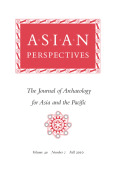
Asian Perspectives-The Journal of Archaeology for Asia and the Pacific
Unveiling the Past: Bridging Cultures through ArchaeologyAsian Perspectives - The Journal of Archaeology for Asia and the Pacific is a prestigious journal published by University of Hawaii Press, focusing on the intricate field of archaeology in Asia and the Pacific. With a rich publication history dating back to 1993, the journal has established itself as a vital platform for disseminating research that illuminates the archaeological heritage and cultural dynamics of this diverse region. Recognized for its scholarly impact, it enjoys a commendable impact factor and ranks in the Q2 category for Anthropology and Archaeology, indicating its significant contribution to these fields. Although it operates on a traditional subscription-based model, the journal is accessible to institutional and individual subscribers worldwide. With an emphasis on interdisciplinary research, Asian Perspectives invites contributions that foster a deeper understanding of historical and contemporary issues through archaeology, making it an invaluable resource for researchers, professionals, and students alike committed to advancing scholarly dialogue in the region. Explore a wealth of innovative studies and insights that continue to shape the understanding of Asia and the Pacific's archaeological narrative.
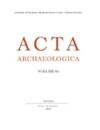
ACTA ARCHAEOLOGICA
Advancing Knowledge, Preserving HeritageACTA ARCHAEOLOGICA is a highly regarded, peer-reviewed journal published by BRILL, focusing on the dynamic field of archaeology. With an ISSN of 0065-101X and an E-ISSN of 1600-0390, this journal disseminates innovative research, critical analyses, and comprehensive reviews that contribute to our understanding of human history, cultural heritage, and archaeological methodology. ACTA ARCHAEOLOGICA has excelled in its field, achieving a Q1 ranking in both the Arts and Humanities and Social Sciences categories for 2023, showcasing its impact and relevance in scholarly discourse. Though not currently open access, the journal caters to a diverse audience of researchers, professionals, and students, offering invaluable insights into archaeological studies from a global perspective. As it continues to foster academic dialogue, ACTA ARCHAEOLOGICA remains a cornerstone for those looking to deepen their knowledge and engage with cutting-edge archaeological research.

Rossiiskaya Arkheologiya
Bridging Cultures Through Archaeological InsightsRossiiskaya Arkheologiya, published by IZDATELSTVO NAUKA, stands as a leading academic journal in the field of archaeology and history, renowned for its commitment to advancing scholarly discourse and research in these vital humanities disciplines. With an impressive Impact Factor and a distinguished position as a Q1 journal in both archaeology and history for 2023, it ranks among the top tier of academic publications, reinforcing its reputation within the scientific community. The journal features a diverse array of studies focusing on archaeological methodologies, historical analyses, and cultural heritage, fostering collaboration and knowledge exchange among researchers, professionals, and students alike. While access to its rich repository of insights is through a traditional subscription model, the journal’s contribution to the archaeological narrative not only elevates current research practices but also propels future inquiries within the Russian Federation and beyond. Addressing critical questions and dialogues within its scope from 2017 to 2023, Rossiiskaya Arkheologiya serves as an essential resource for anyone dedicated to exploring the complexities of human history through material culture.

Lanx-Journal of the Scuola di Specializzazione in Archeologia of the University of Milan
Empowering researchers with open access to knowledge.Lanx-Journal of the Scuola di Specializzazione in Archeologia of the University of Milan, published by Milano University Press, is a distinguished platform dedicated to the field of archaeology. Committed to advancing archaeological research and scholarship, this Open Access journal has been available to the global academic community since 2008, facilitating easy dissemination of innovative ideas and findings. With a strong emphasis on promoting interdisciplinary dialogue, the journal covers a wide range of topics from classical archaeology to contemporary practices, making it an invaluable resource for researchers, professionals, and students in the field. Situated in the historic city of Milan, it aims to contribute to the preservation and understanding of cultural heritage through rigorous academic inquiry and collaboration.

Bulletin of the American Society of Overseas Research
Fostering interdisciplinary insights into archaeology and cultural narratives.Bulletin of the American Society of Overseas Research, published by the University of Chicago Press, serves as a premier platform for scholarly discourse in the fields of archaeology, cultural studies, and history. With its ISSN 2769-3600 and E-ISSN 2769-3589, this journal has swiftly established itself as a key resource for researchers, professionals, and students alike, demonstrating exceptional impact as evidenced by its Q1 rankings in multiple relevant categories for 2023. Notably, it holds the 93rd percentile rank in Arts and Humanities (History) and the 84th percentile in Social Sciences (Cultural Studies), evidencing its respected standing within the academic community. The journal's commitment to advancing knowledge and fostering interdisciplinary dialogue is complemented by its accessible publication from 2022 to 2024, making it an essential read for those engaged in the exploration of global cultural histories and archaeological research.
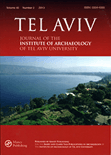
Tel Aviv-Journal of the Institute of Archaeology of Tel Aviv University
Transforming Archaeological Scholarship Since 1974Tel Aviv-Journal of the Institute of Archaeology of Tel Aviv University, published by Routledge Journals, Taylor & Francis Ltd, stands as a premier academic publication in the fields of archaeology, cultural studies, and history. Established in 1974, this journal has significantly contributed to archaeological scholarship and fosters a rich dialogue among researchers and practitioners worldwide, particularly in the context of the Middle East. With a remarkable Q1 ranking in multiple categories, including Archaeology and Cultural Studies, it is recognized for its high-quality, impactful research. The journal's audience consists of academics, professionals, and students eager to explore new findings and interdisciplinary approaches. While it does not operate under an open-access model, its scholarly articles are pivotal for advancing knowledge and understanding in archaeology and related fields, thus continuing its legacy as a vital resource for cutting-edge research up to 2024.

Ancient Asia-Journal of the Society of South Asian Archaeology
Unearthing the Rich Tapestry of South Asian HeritageAncient Asia - Journal of the Society of South Asian Archaeology, published by ARF India, stands as a pivotal resource for the exploration and dissemination of archaeological research focused on the rich history and culture of South Asia. Since its inception as an Open Access journal in 2006, it has become an essential platform for scholars and enthusiasts alike, boasting an impressive range of quartile rankings across multiple disciplines, including Anthropology, Archaeology, History, and Visual Arts. With expansion into various indexed categories and consistent dissemination of impactful research common to this highly diverse field, Ancient Asia aims to foster interdisciplinary dialogue, facilitate collaboration among researchers, and enhance the global understanding of ancient civilizations within the region. By embracing an inclusive access model, the journal encourages wide readership and engagement, positioning itself as a key player for students, professionals, and academics interested in delving into the archaeological marvels of South Asia.
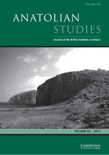
Anatolian Studies
Showcasing Innovative Discoveries in Anatolian StudiesAnatolian Studies, published by Cambridge University Press, stands as a premier forum for research in the fields of archaeology, cultural studies, and history. Established in 1951, this esteemed journal has consistently contributed to the academic discourse surrounding the rich and multifaceted history of Anatolia, earning its place in the Q1 category across multiple disciplines. With a notable impact factor reflected in its Scopus rankings, it ranks among the top journals in its fields: 78th in History, 155th in Cultural Studies, and 55th in Archaeology, showcasing its significant influence and recognition. This journal serves as an invaluable resource for researchers and scholars seeking to delve into the intricacies of Anatolian heritage, providing a platform for innovative research and critical discussion within the academic community. While it currently does not offer open access, Anatolian Studies continues to enrich scholarly resources and advance knowledge within its key areas of focus.